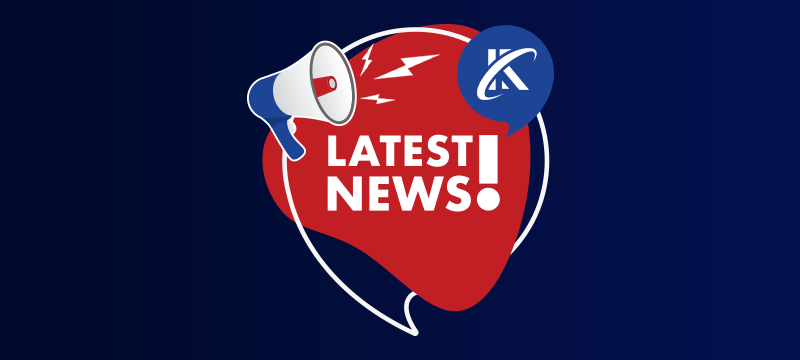Catch up on this week’s round-up of the latest hosting and tech news. Here’s what we’ve uncovered since our last edition.
UK-US Tech Partnership
Rishi Sunak and Joe Biden have formally signed the Atlantic Declaration outlining collaboration between the UK and the US in the fields of technology, data privacy and telecommunications. The agreement will include key technologies, such as semiconductors, quantum computing, artificial intelligence (AI), telecommunications and synthetic biology.
The aim of the collaboration agreement is to establish a shared work plan on critical and emerging technologies, focusing on initiatives such as quantum technologies, joint research and development projects, 5G and 6G innovation, advancing safe and responsible AI, and supporting advanced semiconductor technologies.
Another important aspect of the declaration was the aim to establish a UK-US data bridge that will maintain privacy protections. Hand in hand with this will be collaboration on developing privacy-enhancing technologies (PETs), including those which use responsible AI models. Additionally, the two countries will work together on technology protection, economic security toolkits and supply chain resilience.
The new agreement aligns with existing frameworks, including the US-UK Agreement on Scientific and Technological Cooperation and the US-UK Comprehensive Dialogue on Technology and Data. However, to support technological growth, a US-UK Strategic Technologies Investor Council will be established with the aim of attracting private capital, identifying funding gaps and encouraging new investments in critical and emerging technologies.
Fraud Protection
In a bid to protect online consumers, the UK’s Payment Systems Regulator has introduced mandatory rules requiring victims of authorised push payment (APP) fraud to be reimbursed. Under the new regulations, both the payment service providers (PSPs) involved in the fraud will share the responsibility of repaying the victims. These rules will apply to payments made through the Faster Payments system, which is where the majority of APP fraud takes place.
APP fraud involves cybercriminals deceiving consumers through fake websites and emails to obtain payment authorisations, bypassing banks’ security systems. UK consumers lost more than £600 million to APP fraud in 2021 and the figure is projected to rise to £1.24 billion by 2026.
Under the new rules, the PSP that initiates the transaction has to reimburse the customer in full and the receiving PSP must pay half the value of the fraud back to the sending PSP. This doesn’t apply, however, if the customer has acted fraudulently or with gross negligence.
Driverless Car Rentals
A car rental service that drops off and collects its vehicles using remote driving has been introduced in Milton Keynes. The Fetch vehicle system, operated by the company Imperium Drive, has been undergoing testing in the city for the last 18 months and after 1000 miles without a collision has now been given the go-ahead to roll out its services.
The driving is carried out by an in-house operator who uses built-in cameras to have a comprehensive view of the roads and makes use of anti-crash safety systems in the car’s operating software. For safety reasons, the vehicles are currently equipped with an in-car driver who can take over if required; however, it is hoped that after 18 months of further testing, these will no longer be needed.
While the cars are delivered and collected using remote drivers, customers who rent the electric cars will drive them manually as normal. The aim of the technology is to make car rental more convenient for the user (they can also rent the vehicles using an app) and to cut the cost of delivery and collection for rental businesses.
Intelligent Robo-Chef
A robotic chef, developed by boffins at the University of Cambridge, has learnt how to create its own recipe and successfully prepare a range of other salad dishes simply by watching instructional cookery videos. The researchers programmed the robot with eight simple salad recipes chosen from a cookery book and after analysing videos of humans demonstrating making the recipes, learnt how to prepare and create them.
During the research, the robot was able to accurately identify the correct recipe from watching the videos in over nine out of 10 cases – even though the different chefs varied ingredients and made cooking errors. In making the dishes, not only did the robot follow instructions; it was able to do so using kitchen tools. What was most surprising, however, was that the robot came up with its own unique salad recipe. The researchers believe that as the robo-chef gets better at identifying ingredients in food videos, it will be able to use websites like YouTube to create an even wider repertoire of recipes.
AI Wine App
Baffled by the choice of wines in your local supermarket? Well, there’s now an app, called Sippd, that uses AI to help you find your ideal tipple. Users begin by completing a wine quiz that captures their preferences in terms of colour, body, acidity, flavour, sweetness and price. It then uses AI to generate personalised taste matches for each user, based on their preferences. Once this is done, you can use the app to scan wine lists or labels using your phone’s camera and will be provided with a list of taste match scores for each bottle.
What’s more, Sippd’s learning capabilities improve over time as users share their wine purchases and this helps make recommendations increasingly accurate and suited to individual tastes.
Visit the WHUK website for more news, knowledge base articles, blog posts and information on our wide range of services.


